KCSIE Updates and Safeguarding in Education 2023-24: Lessons Learned
_1000.png)
This blog is based on Judicium’s Safeguarding ‘Sofa Session’ from the 3rd of July, with our resident expert Joanne Bocko. This session focused on the updates to KCSIE 2024, how to implement these in your school for September, considerations for policy, procedure and practice, the KCSIE 2025 consultation, and safeguarding challenges 2023-24.
KCSIE 2023-2024
Starting with KCSIE 2023-2024, the main additional requirement was to implement effective filtering and monitoring processes. At this point in the year, it would be expected your school or trust has:- All necessarily roles and responsibilities assigned, so the DSL has the lead responsibility along with a governor or trustee (most likely your safeguarding governor).
- A filtering and monitoring system that provides timely and critical reports which are received by key safeguarding staff.
- NB: These reports shouldn’t only go to the IT team as they may not understand the risks associated with any alerts.
- Ensured all staff and governors have received training on your F&M (filtering and monitoring) system and what to do if there are any problems.
- Been able to review incidents to identify any trends or areas for improvement.
- Been provided oversight and strategic challenge from your governors on your systems and have been aware of the decisions made and any updates.
- Completed tests to check your systems are working.
- Also consider if you’re completing any updates over the holidays and checking again.
- Completed an annual review on the system.
- For Judicium clients, this is available on Jedu.
Poll 1
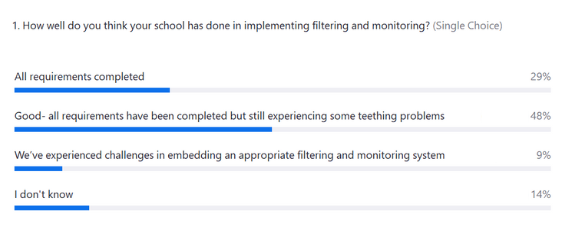
Filtering and Monitoring
From our Judicium consultants’ experience auditing schools, the most common areas of difficulty with regards to filtering and monitoring are:- over blocking
- receiving reports in a way that aren’t easy to understand
- critical alerts are not sent to a sufficient number or people or the right people
If you’re experiencing these issues, consider speaking with your F&M provider to resolve these. Similarly, we’re seeing more schools jump ship to a different provider which may be something you’ll wish to consider in more depth.
You should have ensured your lettings and hiring procedures are appropriately in place. This included a copy of their safeguarding policy. Your contract with them should state how failure to comply with safeguarding would lead to a termination of the contact.
Recruitment paperwork should reflect how online searches will be carried out on candidates, and you should have clear policies and procedures on children absent or missing from education that are provided to all staff at induction.
KCSIE 2024
The majority of changes to KCSIE 2024 reflect updated definitions.
- Definition of safeguarding and promoting the welfare of children now reflects the newer definition as per Working Together to Safeguard Children.
-
- New bullet point ‘Providing help and support to meet the needs of children as soon as problems emerge’ (emphasising early help).
- Protecting children from maltreatment, further details ‘whether that is within or outside the home, including online’ (clearly specifies all contexts for abuse and neglect).
- And then as per the previous definition we still have:
- Preventing the impairment of children’s mental and physical health or development.
- Ensuring children grow up in circumstances consistent with the provision of safe and effective care.
- Taking action to enable all children to have the best outcomes.
While the new amendments are more thorough, there’s still some ambiguity around safe and effective care, and best outcomes. This area is where we often see disagreements with parents and other professionals as these are subjective terms.
- Definition of children who staff should be particularly alert for the need of early help now includes children who:
-
- Have experienced multiple suspensions, are at risk of being permanently excluded from schools, colleges and in Alternative Provision or a Pupil Referral Unit.
- The previous version states ‘have a family member in prison, or is affected by parental offending’ has been changed to ‘has a parent or carer in custody, or is affected by parental offending,’ which may further acknowledge arrests and not imprisonment, i.e. taken into custody after a domestic incident, but not formally charged.
- Interestingly, ‘persistently absent from education, including persistent absences for part of the school day’ has been removed from 2024, along with ‘has returned home to their family from care’.
NB: There is new attendance guidance coming into force in August 2024 in Working Together to Improve School Attendance. It’s possible the main direction is now due to come from this guidance. It’s another document DSLs should be familiar with in time for September as it addresses persistently absent and severely absent pupils and has a safeguarding lean to it.
-
Finally, the newest version of KCSIE is now referencing Abuse, Neglect and Exploitation within all the main headings and paragraphs, bringing exploitation to the forefront of our understanding of the definition of abuse, and the risks facing young people.
-
KCSIE 2023 references domestic abuse within the definition of abuse. The 2024 version adds to this by clearly stating children who ‘see, hear or experience its effects’. We know that children are now considered victims in their own right and this definition reiterates this. NB: From September Judicium will be offering an online Domestic Abuse training course where this is explored further.
-
In the paragraph on ‘Safeguarding Issues’ – children ‘deliberately missing education’ has been amended to reflect revised definition of ‘unexplainable and or/persistent absences from education’. NB: this includes half days - it doesn’t have to be a full day absent.
-
Lastly, there is a reminder that the school remains responsible for all students in AP. We’re finding schools are already actioning this appropriately through regular attendance checks, regular meetings, site visits, checking DBS through letters of assurance and regular check-ins with children and families, therefore it shouldn’t result in any big changes for many.
The biggest growth is in the section of ‘Children who are lesbian, gay, bisexual or gender questioning’, with an updated title heading from LGBT. This section is still under review pending the outcome of the consultation on Gender Questioning guidance.
However, KCSIE currently suggests:- Children perceived to be lesbian, gay, bisexual or gender questioning can be as vulnerable as children who aren’t.
- Families and carers should seek clinical help and advice.
- Wider vulnerabilities of gender questioning children should be explored such as mental health and SEND.
- A cautious approach should be undertaken exploring the child’s individual needs.
- Children are at risk if they don’t have trusted adults they can be open with.
The remainder of the changes include links to the NSPCC guides on children with SEN, and age rated guides for children in the court system.
Safeguarding in Education
Looking at safeguarding in education and reflecting on the last year, Judicium supported schools across a range of issues through our auditing and consultancy service and has seen a wide range of safeguarding challenges.
Poll 2
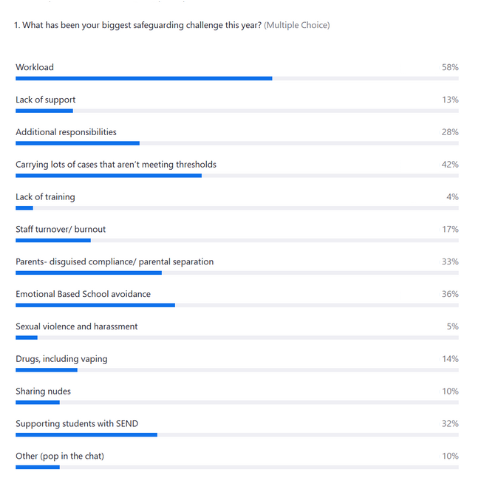
At Judicium, we’ve seen an increase in queries around Educational Based School Avoidance and separated parents. In response to this we delivered Live at 3.45 training sessions, which can be offered to your school if you unable to attend. We’re also offering a new course on online safety which is suitable for DSLs or all staff, so you might wish to consider a session at your school.
Most of the other areas sit within support for the DSL, and the day-to-day challenges of the role and workload. The consultation for KCSIE 2024-25 asked DSLs about the support they receive and what changes they would like to see.
At Judicium, we considered while many public sector workers such as nurseries and social workers must receive supervision as mandatory to support them in their role, the education sector do not.
Supervision
Working together to Safeguard Children was recently updated and for the first time referenced supervision as a recommendation for level 2 staff, which includes DSLs.
Poll 3
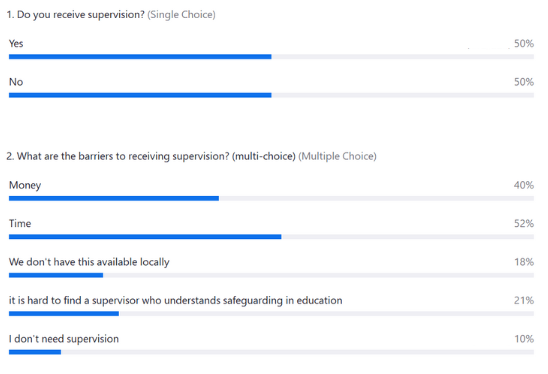
At Judicium, we recently launched our supervision offer, which provides protected time for education professionals to reflect on practice, make decisions, assess risk, and ultimately improve the quality of practice. It facilitates the exploration and recognition of the emotional impact of work with children and families within the school context, ultimately allowing safeguarding professionals in schools to feel supported in fulfilling their statutory duties by individuals who know the sector well.
If you would like more information on this service, please contact us.
Some common areas we often see for improvement within schools are as follows:- Single central record - We might see gaps on this record including incomplete records for agency staff and contractors, or where a letter of assurance does not provide enough appropriate information.
- Prohibition from teaching and s128 checks are not used consistently, or some staff may not have received an appropriate check.
- Some schools aren’t fully analysing the safeguarding risk for those on part-time timetables.
- NB: This is an area fairly frequently commented on by Ofsted, so although it’s not in KCSIE per se, it does appear in Ofsted reports.
- Clarity of record keeping with regards to allegations of abuse against staff. You need to be conscious of best practice in KCSIE here.
- Finally, student voice around child-on-child abuse and discrimination, especially for members of the LGBT community. Your school may be doing lots of work here, but you should be confident your best intentions are resulting in young people feeling confident in the system and safe. Unfortunately, this isn’t always the case.
KCSIE Consultation for 2024-25
The consultation is split into the following areas:- Section 2: The role of the designated safeguarding lead (this is where we have supervision and may sit with practitioners to provide their thoughts on this.)
- Section 3: Recording, retaining, and sharing child safeguarding information
- Section 4: Safer recruitment
- Section 5: Filtering and monitoring systems and safeguarding children online
- Section 6: Child-on-child sexual violence and sexual harassment
- Section 7: Protecting children in boarding schools and residential special schools
- Section 8: Quality assuring safeguarding arrangements in schools and colleges
- Section 9: Other safeguarding issues on which we welcome your views
Additional Information
The Safeguarding Service is hosting live, virtual training courses this term including a new Online Safety course, Safeguarding for Governors, Safer Recruitment, Live @ 3:45 sessions and much more. To view all upcoming courses, dates and links click HERE.
Safeguarding eLearning Courses
You can follow us on Twitter: @JudiciumSG @JudiciumEDU
If you’d like to review Judicium’s forthcoming sofa sessions please click here
© This content is the exclusive property of Judicium Education. The works are intended to provide an overview of the sofa session you attend and/or to be a learning aid to assist you and your school. However, any redistribution or reproduction of part or all of the contents in any form is prohibited. You may not, except with our express written permission, distribute or exploit the content. Failure to follow this guidance may result in Judicium either preventing you with access to our sessions and/or follow up content.
Related content

This blog is based on Judicium’s Safeguarding Supervision On The Sofa: Your DSLs Safe Space ‘Sofa Session’ from the 25th June 2025, with our resident experts Helen King and Sarah Cook.
).png)
Supervision is dedicated time for professionals to reflect openly on the challenges of the cases they manage. This blog explores the common misconceptions, myths and the all important benefits to Safeguarding Supervision. Don't miss our Safeguarding Sofa Session on Supervision: Your DSLs safe space on 25th June at 10am OR 11:30am.

This blog is based on Judicium’s The Essential Learnings You'll Gain from a Safeguarding Audit: What every school and trust should know ‘Sofa Session’ from the 14th May 2025, with our resident expert Joanne Bocko.
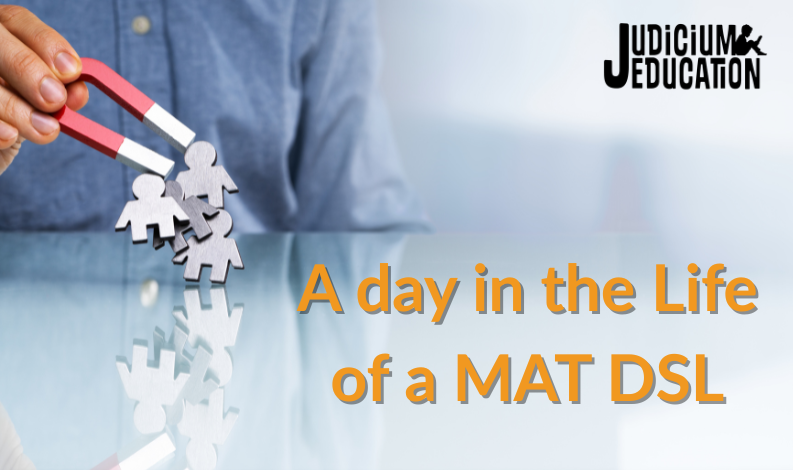
This blog deep dives into the everyday life of a Multi Academy Trust (MAT) Designated Safeguarding Lead (DSL). For a DSL, every decision echoes across schools, staff, and pupils. It’s a responsibility that requires a steady hand, sharp focus, and unshakable resolve. With over 22,000 multi-academy trusts in the UK, the role of a MAT DSL has become increasingly serious.
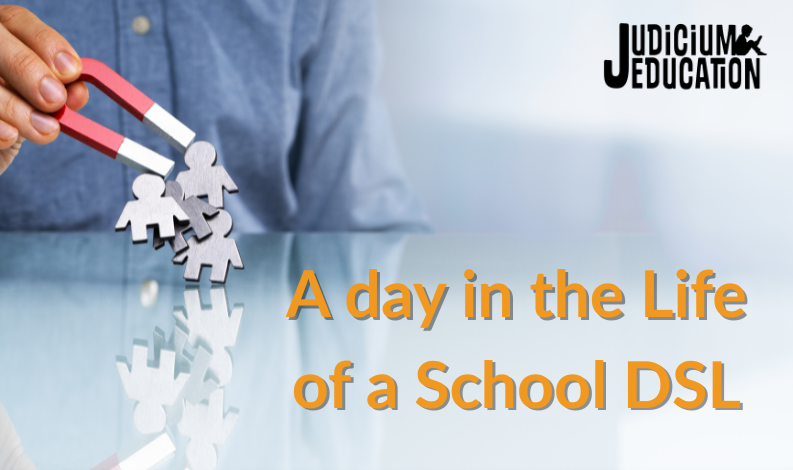
Volume 2 of our ‘A Day in the Life of a DSL’ series takes a deeper dive into the role of the Designated Safeguarding Lead (DSL) within schools. For many DSLs, the reality involves navigating unpredictable, emotionally charged situations that require immediate action. Their role isn’t about ticking boxes — it’s about making decisions that can profoundly impact a child’s life.
.png)
This is a summary taken from Judicium’s DPO ‘Sofa Session’ from 2nd of April, with Helen King and Sofia Mastrangelo. This session focused on the guidance on sharing safeguarding data and concerns, retention rules, and managing SARs in relation to safeguarding and considering exemptions.

Sofa Sessions | Safeguarding